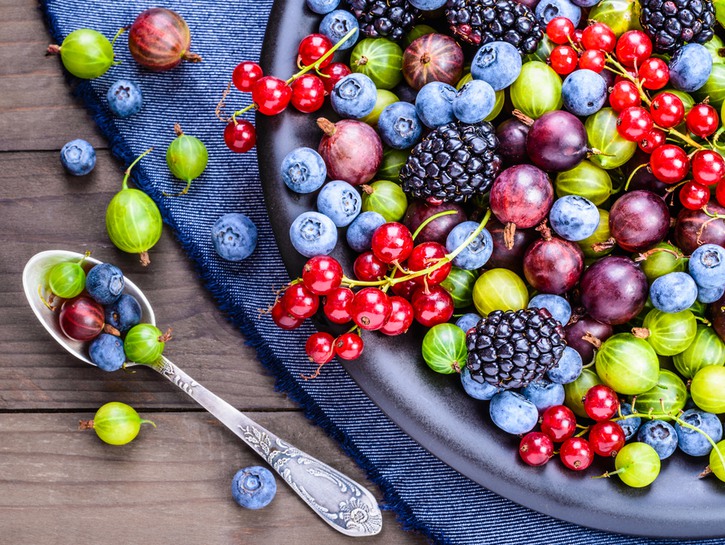Antioxidants are often brought up when talking about health and diets, but what they are and what they do isn’t exactly common knowledge. Learning about antioxidants, their benefits and the different foods loaded with them is necessary to shape a healthy diet. After this, you’ll have the answer to the question: “What are antioxidants?”
What Are Antioxidants, Anyway?
Antioxidants are substances, either natural or man-made, that help protect against various kinds of damage to our cells. The body is constantly going through a natural process known as “oxidation,” a chemical reaction that occurs in an act as simple as breathing.
Disruptions during this process lead to the creation of free radicals, also known as “oxidants,” which are volatile molecules that cause damage to the body’s cells. While that sounds terrifying, free radicals are necessary to help our immune system fight off infectious bacteria.
Common Antioxidants
Some of the most common antioxidants include:
- Vitamin A – found in milk, eggs, and liver
- Vitamin C – found in most fruits and vegetables
- Vitamin E – found in nuts and seeds
- Beta-carotene – found in brightly colored fruits and vegetables
- Lycopene – found in pink and red fruits and vegetables
- Lutein – found in green leafy vegetables
- Selenium – found in pasta, bread, and grains
It should be noted that each antioxidant has a different chemical makeup and should be treated differently. While each has its own health benefits, too much of one antioxidant can be hazardous to your health.

How Do They Benefit Your Body?
Our bodies go into a state of oxidative stress when free radicals overwhelm the protective defenses our body has in place to keep them in check. During this state, the damage free radicals do to our cells can lead to cancer, heart disease, Alzheimer’s disease, arthritis, and diabetes. Antioxidants play a crucial role in balancing the free radicals’ volatile energy.
According to a study found in the United States National Library of Medicine, antioxidants act as “radical scavenger, hydrogen donor, electron donor, peroxide decomposer, singlet oxygen quencher, enzyme inhibitor, synergist, and metal-chelating agents.” This basically means that antioxidants create a defense system for our bodies that protect us from threats, both internal and external.
What Foods Have Antioxidants?
There are plenty of food sources that are rich in antioxidants, allowing you to shape a diet that works around your tastes while still supplying you with the required amount of antioxidants to maintain a healthy lifestyle. You’ll want to have several different sources of antioxidants to fully maximize their potential benefits.
Here is just a short list of foods that are great sources of antioxidants:
- Dark colored grapes
- Berries
- Apples
- Artichokes
- Kale
- Broccoli
- Carrots
- Squash
- Sweet potatoes
- Nuts
- Green tea
- Black tea
It’s recommended to steam vegetables to preserve as many of the nutrients in the veggies as possible and to load up on a wide variety of nuts, as they provide many of the healthy fats that the body needs.
As important as it is to load up on antioxidants, it’s especially important to get your antioxidants from a wide variety of sources, as the amazing benefits of antioxidants may only come to fruition if they’re working together.

Can You Take Antioxidant Supplements?
Going the natural route is the best way to get your daily dose of antioxidants, but people are always going to find a way to sneak supplements in place of fruits, vegetables, and nuts. According to the National Health and Nutrition Examination Survey 2009 analysis (1999-2000 and 2001-2002), supplements accounted for more than half of the intake of key antioxidants like vitamin C (54%) and vitamin E (64%).
Although you can take antioxidant supplements, they’re probably not going to be as beneficial as going the natural route.
Are They Safe?
While people might think that getting antioxidants and other nutrients from supplements instead of natural sources, high does could have the opposite effect.
According to the National Center for Complementary and Integrative Health (NIH), high-dose antioxidant supplements may be harmful to your health. The NIH gives the example of results from studies linking the use of “high-dose beta-carotene supplements” to an increased risk of lung cancer in smokers and use of “high-dose vitamin E supplements” to an increased risk of hemorrhagic stroke and prostate cancer.
The NIH also stated that antioxidant supplements may have an impact on the effectiveness of certain medications. The agency gave vitamin E supplements as an example because they may increase the risk of bleeding in people who are taking blood thinners. There is also conflicting evidence as to whether or not antioxidant supplements affect cancer treatments. Despite this disagreement, the National Cancer Institute recommends that cancer patients talk to their doctor before incorporating supplements into their diet.
Do They Even Work?
Studies into the overall effectiveness of antioxidant supplements are inconclusive at best, but most don’t provide enough evidence to make a case that they are cure-alls for certain diseases.
One of the reasons why the effectiveness of antioxidant supplements is questionable compared to natural forms is the chemical composition of antioxidants in foods can have different effects on the bodies than the supplement form. This can be the result of the presence of other chemicals in foods that are not present in supplements.
Should You Take Them?
If you are using antioxidant supplements in addition to following a healthy, well-balanced diet full of fruits and vegetables, then yes, you should be okay taking the pill forms. However, it’s not advised to take supplements in the place of a healthy diet.
People who have certain medical conditions and are taking medications to treat those conditions are recommended to contact their doctor before incorporating supplements into their diet.
